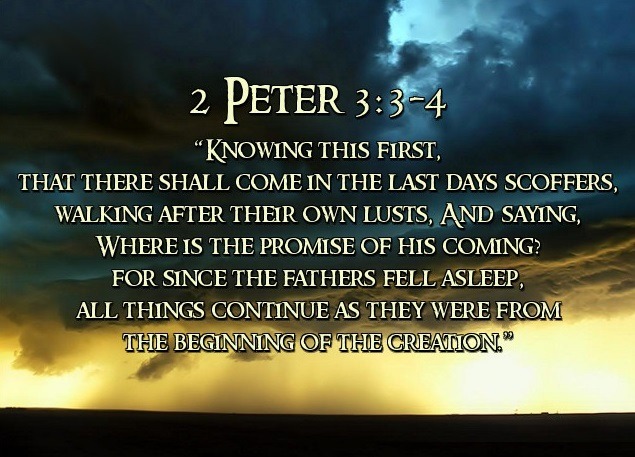
“Therefore, beloved, since you look for these things, be diligent to be found by Him in peace, spotless and blameless, and regard the patience of our Lord to be salvation; just as also our beloved brother Paul, according to the wisdom given him, wrote to you, as also in all his letters, speaking in them of these things, in which are some things hard to understand, which the untaught and unstable distort, as they do also the rest of the Scriptures, to their own destruction” (3:14-16).
Imagine the case of a man who has been cast upon a dreary inhospitable, deserted island. He knows the “mayday” message was heard, the coordinates of his location were understood, and that soon a vessel will come and bear him away.
He paces its barren and deserted sands, looks at the overcast sky, and anxiously awaits the arrival of the rescue ship which will carry him to a land of light and life.
Such is much like the Christian saint. He is an exile far from his home. His sentiments are correctly stated in the emotionally charged statements of Paul, “For indeed in this house we groan, longing to be clothed with our dwelling from heaven; . . . indeed while we are in this tent, we groan, being burdened, . . .” (2 Corinthians 5:2, 4).
Peter expressed this sentiment when he exhorted his readers to be “looking for and hastening the coming of the day of God” (3:12).
The believer knows that the rescue vessel is prepared and the convoy is ready which will bear him away from a barren wilderness to a happy land flowing with milk and honey. But the rescue seems so far away! It seems we are stuck waiting to be rescued.
The anxiety of waiting is well known. Each of us has yearned for some important event to arrive, and the waiting has seemed endless. Each passing day adds to the anxiety of the delay. Delays are irritating and depressing.
The gloomy periods of waiting spawned the Army’s ridiculous motto, “Hurry up and wait!”
Peter’s present words are written to brethren who, like us, were stuck waiting for the second coming. They were impatient and restless.
The thought that the second coming would never take place had pricked the minds of several (3:4). Peter turns to this delay and deals with it so his brethren could accept the delay and act properly during it.
The Bible is quite frank in stating that a delay would exist between the ascension of Christ and His second coming. Even with the large number of Bible texts advising us about the delay, it is still easy to join with those in Peter’s time and ask, “Why is the delay so long?”
The gracious Father in heaven never wants His children to be left in a quandary of faith.
He provided the readers of Peter’s second letter an answer to this nagging question. The delay is now in progress; we are stuck waiting. Peter reveals what we should do while we are stuck waiting in 2 Peter 3:14-16.
REMEMBER TO . . . DO YOUR UTMOST TO BE PREPARED (3:14)
Peter’s words stress preparation in two broad areas. Preparation with God. First, there must be preparation with God—“peace” (3:14). Although some see this peace being applied to all relationships shared in the church (to God, self, and others), the context seems to limit it only to one’s relationship with God.
Those who await the second coming of Christ must be sure they have made proper peace with God. A peaceful relationship with God results only when one has been justified through Christ’s sacrifice. It is impossible for one to have peace with God until this process has been completed. In 1:2-4, Peter referred to this reconciliation and peace with God.
He remarked that believers had become partakers of the divine nature “having escaped the corruption that is in the world.”
When we realize that we are terminal people living on a terminal earth (3:10), we should quickly sue for peace with God. How do you stand in regard to having secured “peace” with the Almighty God?
Preparation for Life
Second, there must be preparation in life—“spotless and blameless” (3:14). The words found here are the exact opposite of those found in 2:13 describing the people wedded to the ungodliness of this world: “They are stains and blemishes.”
To help you understand the interesting use found here, consider the words in the original Greek. “Spot” is translated from the word spiloi, while “spotless” comes from the Greek word aspilos. The word “blemish” is from momoi, while “blameless” is derived from amometos.
Peter urges believers to live exactly opposite from those in the world. Believers are to be free from the vices which stain and blot the soul (cf. Revelation 3:4). Basically, this point addresses the morality of daily living. Believers are to make sure they live as their Lord did.
Christ lived each day “unblemished and spotless” (1 Peter 1:19). When believers discipline their lives, they will live in the same way and be prepared for the Lord’s return (1 John 3:3).
This encouragement is timely for God’s children today. How easy it is to become engrossed in this world and forget about the world that is to come!
Peter tries to warn us about being blinded by the anxieties and cares of this world. He urges us to “be diligent.” The term literally means to strive earnestly, zealously for an objective.
One of the newer translations renders this phrase as “make every effort.” We must have enthusiasm as we wait for the Lord to return. A halfhearted response will never do.
This response of Peter to the anxious cries of his brethren who longed for the second coming needs to be understood today. Use this time to prepare yourself for the Lord’s return.
Prepare first, by establishing a peaceful relationship between yourself and God. Prepare, second, by living a life of moral uprightness. Prepare by being diligent.
As one old saint faced the end of his days, he reflected on these timely words of Peter. His remarks are impressive: “There is nothing more certain than death; nothing more uncertain than the time of dying. I will, therefore, be prepared for that at all times, which may come at any time, and must come at one time or another. I shall not hasten my death by being ready, but sweeten it. It makes me not die the sooner, but the better.”
While you are stuck waiting for Christ to come back, use every minute to make sure you are ready.
REMEMBER TO . . . KEEP YOUR MIND FOCUSED ON THE PURPOSE OF DELAY (3:15a)
Peter asks his readers to remember a point that he has already forcefully made. The delay in Christ’s return exists so that all who so desire may be saved (cf. 3:9). You could paraphrase the point like this, “And remember why He is waiting. He is giving us time to get His message of salvation to others.” Instead of viewing the de- lay as a broken promise by God, we are urged to see it as evidence of His great patience to provide all men with peace.
The godless may scoff at the delay because they fail to understand its benevolent purpose. They fail to realize that during the delay God is holding the door of salvation open as long as possible. But when the Bridegroom comes for His bride, the door of hope will be slammed shut never to be reopened. All who wait until the last minute to be saved will face the same catastrophe as the foolish virgins. They returned after buying additional oil for their lamps only to find “the door was shut” and their pleas for the door to be reopened fell upon deaf ears (cf. Matthew 25:1-13).
Christians have a pressing duty to realize that they are bound by the delay in Christ’s return to reach others by teaching them the gospel. During the delay, it is wrong for God’s saints to imagine that they have no duty or obligation to the lost. Christ spoke of His mission: “My meat is to do the will of Him that sent me, and to accomplish His work.” His mission was to come to earth to save lost men (John 3:16). But He urged the same mission upon His disciples: Do you not say, “There are yet four months, and then comes the harvest”? Behold, I say to you, lift up your eyes, and look on the fields, that they are white for harvest. Already he who reaps is receiving wages, and is gathering fruit for life eternal; . . . (John 4:35, 36).
Since the Lord is delaying His return so lost souls can be saved, do you see your personal duty to help seek and save lost souls? The time is short. We must act quickly in seizing opportunities to fulfill our obligations.
The following story illustrates the plight of present-day evangelistic zeal in the church. When a little boy was lost in the woods, an alarm was sounded. The whole community responded: Fishermen abandoned their boats, merchants closed and left their shops, farmers forsook their plows and fields, and housewives left their washing and ironing. Everyone turned out to hunt for the little fellow. Feverish haste was evident because during the night harm might come to him.
With their tireless searching, the frightened child was found. As a result of the rescue, joy was felt by all. Today that little boy is grown. He is lost again, but no one seems to care. His mom and dad are too busy making a living.
The church is too busy and seems not to care. No alarm is sounded. Yet a far worse fate looms ahead for him now—he is lost in sin and no one seems to care enough to do anything about it. Be diligent in using the delay to save the souls of those who are lost.
REMEMBER TO . . . HANDLE THE SCRIPTURES IN THE RIGHT WAY (3:15b, 16)
The delay in Christ’s return has been adequately explained (cf. 3:8-13). Even with that clear explanation, some will refuse to accept it.
The emphasis in this point is upon doctrinal steadfastness. We must be sure to handle rightly God’s Word (cf. 2 Timothy 2:15). Peter says that some unethical teachers “distort” the Scriptures. This term refers to the action of a windless wrench, an instrument of torture, or the “rack.”
Peter uses it here to portray the distortion, straining, and twisting that false teachers use on truth. They will twist and torture the truth so that it appears to uphold their error. Those who participate in such acts will face destruction (3:16b).
God expects us to act with responsibility when we interpret His Book. We must be consistent with all other biblical texts. We must not change fundamental doctrines.
During the in-between stage while we are waiting for Christ’s return, God has given us the Bible to guide us. Let us be honest in its doctrine and truthful in its application to our lives. To do otherwise brings a grim harvest on the judgment day! How deadly delay can be when it comes to obeying God’s commands to be saved. Do not wait! When you to do until He comes?”
These pressing questions are clearly answered by Peter. We are indeed stuck waiting for Jesus Christ to return. But being stuck does not mean we should be doing nothing. Peter tells us, “Be diligent!”
Two Approaches to the Bible (2 Peter 3:14, 16)
- The Right Approach. “Be diligent” (3:14). This leads to peace, spotlessness, and blamelessness
- 2. The Wrong “Distort” the Scriptures to suit our prejudices (3:16). This leads to destruction
CONCLUSION
The Lord has delayed His return so our delay in rendering obedience to His will may cease. Peter’s thoughts could not be stated in clearer terms. Procrastination on our part will only lead to tragedy. Let us be careful and not hesitate or prolong our delay in obeying His command understand this point.


 We Americans do not handle delays very well. Our culture simply does not like to wait. Yet we wait less today than men have ever waited.
We Americans do not handle delays very well. Our culture simply does not like to wait. Yet we wait less today than men have ever waited. When you think of cruelty, you probably think of terrorists blowing up innocent people or of evil parents abusing a little child. But you probably wouldn’t think of false prophets.
When you think of cruelty, you probably think of terrorists blowing up innocent people or of evil parents abusing a little child. But you probably wouldn’t think of false prophets.